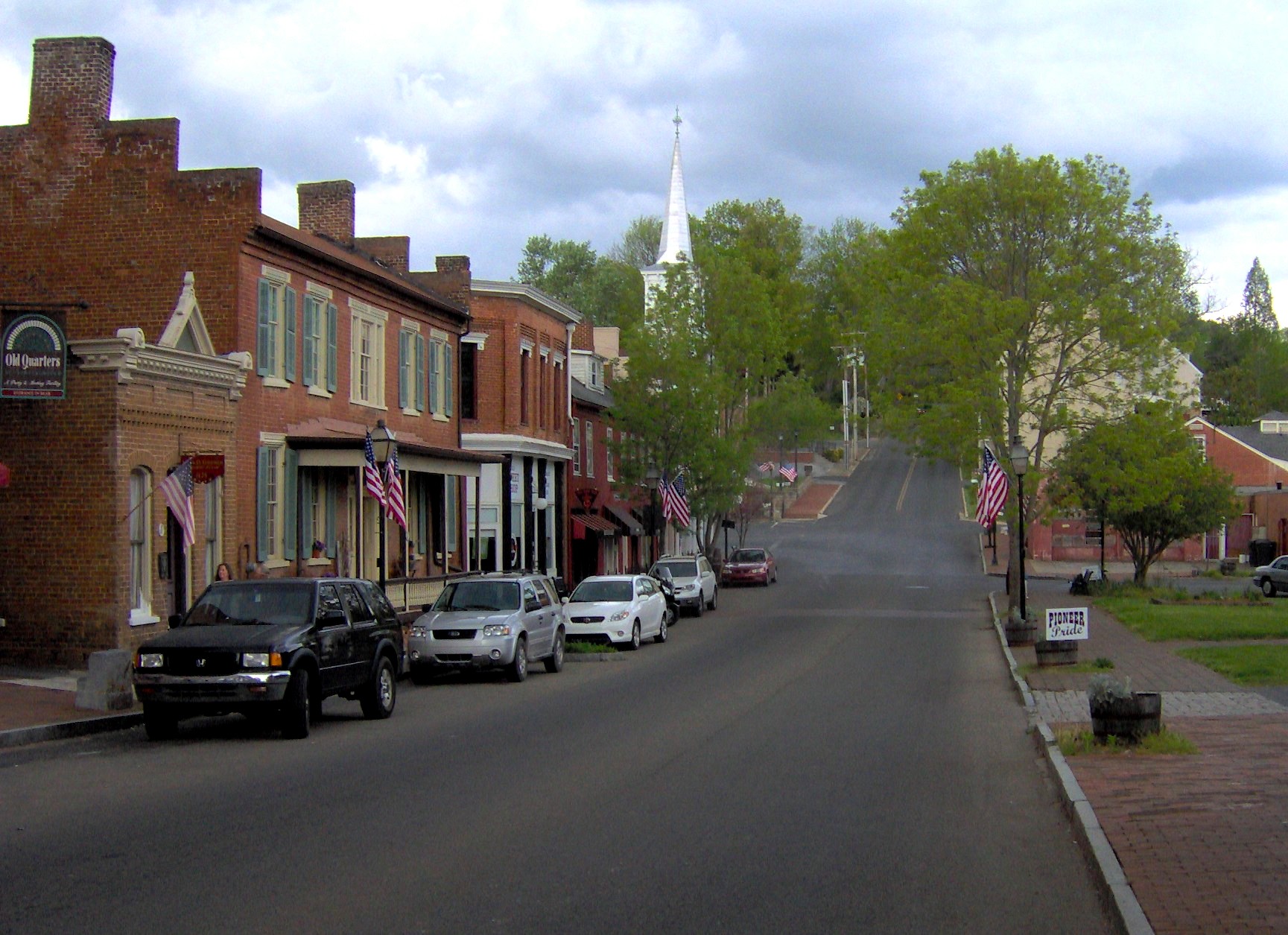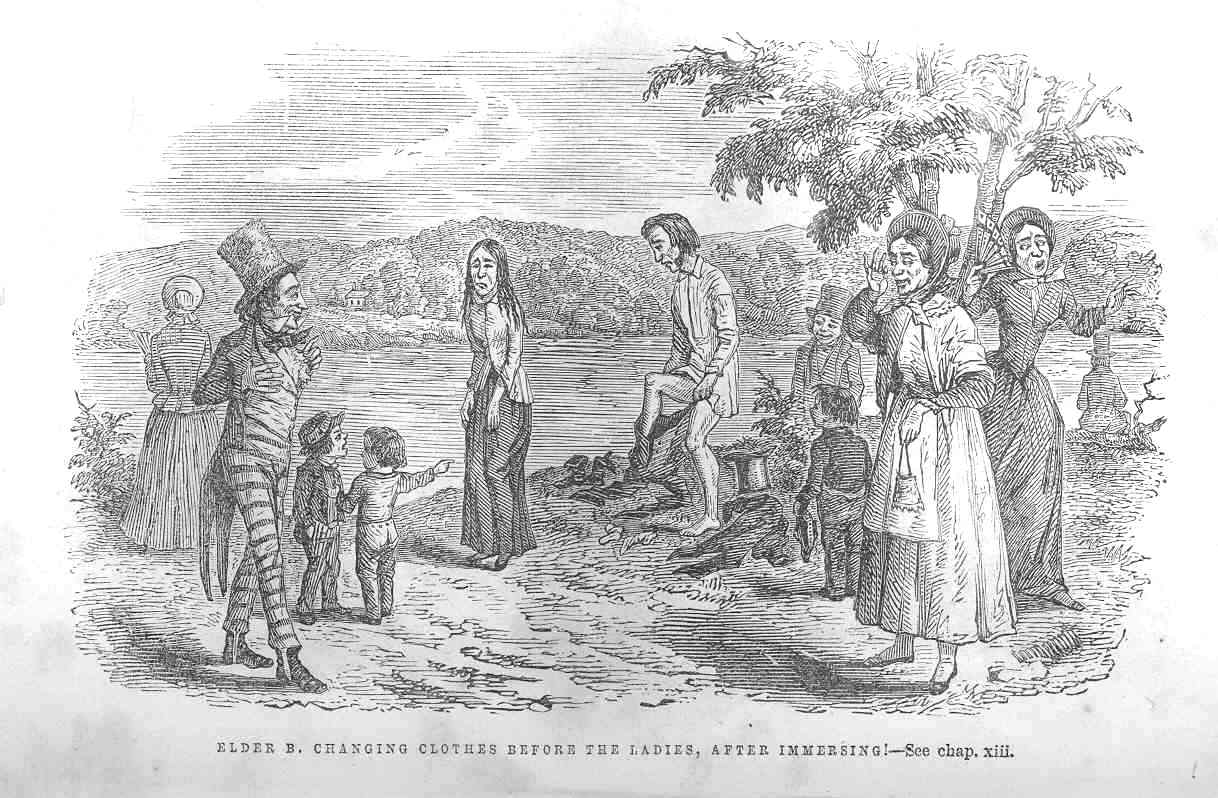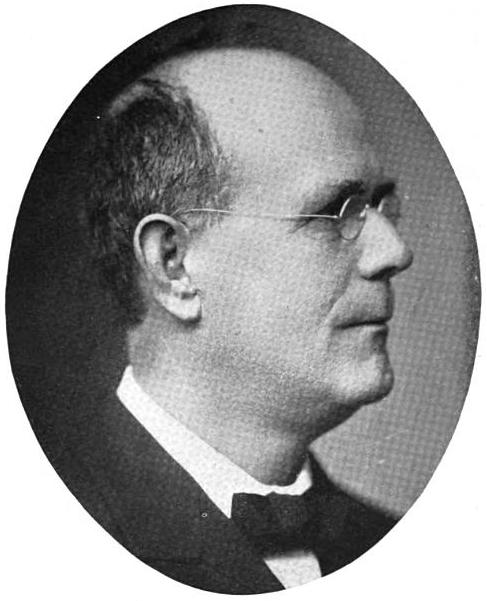|
Jonesborough United Methodist Church
Jonesborough United Methodist Church is a church in Jonesborough, Tennessee. Its building is listed on the National Register of Historic Places as a contributing property in the Jonesborough Historic District. History The church was formed in 1822 under the leadership of a layman from Nashville, H. R. W. Hill. The church's first building was located behind the town courthouse, on the public square. Later, due to the planned coming of the railroad, land was purchased at the present location, in 1847, for the construction of the current building, which was opened late that year. Notable members of the congregation in the early years were Elbert F. Sevier, a grandson of Governor John Sevier; Parson William Gannaway Brownlow (later governor of Tennessee during Reconstruction); and Elijah Embree Hoss (who became a bishop of the Methodist Episcopal Church, South). The building was tied up in a legal battle immediately following the Civil War A civil war or intrastate ... [...More Info...] [...Related Items...] OR: [Wikipedia] [Google] [Baidu] |
Jonesborough, Tennessee
Jonesborough (historically also Jonesboro) is a town in, and the county seat of, Washington County, Tennessee, in the Southeastern United States. Its population was 5,860 as of 2020. It is "Tennessee's oldest town". Jonesborough is part of the Johnson City metropolitan statistical area, which is a component of the Johnson City– Kingsport–Bristol, TN and VA combined statistical area – commonly known as the " Tri-Cities" region. History Located in the far northeast corner of the state, Jonesborough was founded by European Americans in 1779, 17 years before Tennessee became a state and while the area was under the jurisdiction of North Carolina. It was named after North Carolina legislator Willie Jones, who had supported the state's westward expansion across the Appalachian Mountains. The town was renamed "Jonesboro" for a period of time, but it took back its historic spelling. Jonesborough was originally a part of the Washington District. In 1784, it became t ... [...More Info...] [...Related Items...] OR: [Wikipedia] [Google] [Baidu] |
National Register Of Historic Places
The National Register of Historic Places (NRHP) is the United States federal government's official list of districts, sites, buildings, structures and objects deemed worthy of preservation for their historical significance or "great artistic value". A property listed in the National Register, or located within a National Register Historic District, may qualify for tax incentives derived from the total value of expenses incurred in preserving the property. The passage of the National Historic Preservation Act (NHPA) in 1966 established the National Register and the process for adding properties to it. Of the more than one and a half million properties on the National Register, 95,000 are listed individually. The remainder are contributing resources within historic districts. For most of its history, the National Register has been administered by the National Park Service (NPS), an agency within the U.S. Department of the Interior. Its goals are to help property owners and inte ... [...More Info...] [...Related Items...] OR: [Wikipedia] [Google] [Baidu] |
Contributing Property
In the law regulating historic districts in the United States, a contributing property or contributing resource is any building, object, or structure which adds to the historical integrity or architectural qualities that make the historic district significant. Government agencies, at the state, national, and local level in the United States, have differing definitions of what constitutes a contributing property but there are common characteristics. Local laws often regulate the changes that can be made to contributing structures within designated historic districts. The first local ordinances dealing with the alteration of buildings within historic districts was passed in Charleston, South Carolina in 1931. Properties within a historic district fall into one of two types of property: contributing and non-contributing. A contributing property, such as a 19th-century mansion, helps make a historic district historic, while a non-contributing property, such as a modern medical clinic ... [...More Info...] [...Related Items...] OR: [Wikipedia] [Google] [Baidu] |
Jonesborough Historic District
The Jonesborough Historic District is a historic district in Jonesborough, Tennessee, that was listed on the National Register of Historic Places as Jonesboro Historic District (reflecting the spelling of the town name at the time) in 1969. Staff of the Tennessee Historical Commission surveyed 158 buildings in the town in 1969 and found 72 worth preservation. The district includes Queen Anne, Greek Revival, and Federal styles of architecture among its 72 contributing buildings located in a more than area. Some contributing buildings include the Jonesborough United Methodist Church, which was built in 1847 and renovated in 1945 and 1959; the Washington County Courthouse, built in 1913 on the site of the first courthouse of the county; and the Chester Inn, which was built c. 1797. The district is an irregularly shaped area, roughly bounded by College Street on the north, the junction of Main Street and Franklin Avenue on the east, Depot Street on the south, and 3rd Avenue o ... [...More Info...] [...Related Items...] OR: [Wikipedia] [Google] [Baidu] |
John Sevier
John Sevier (September 23, 1745 September 24, 1815) was an American soldier, frontiersman, and politician, and one of the founding fathers of the State of Tennessee. A member of the Democratic-Republican Party, he played a leading role in Tennessee's pre-statehood period, both militarily and politically, and he was elected the state's first governor in 1796. He served as a colonel of the Washington District Regiment in the Battle of Kings Mountain in 1780, and he commanded the frontier militia in dozens of battles against the Cherokee in the 1780s and 1790s.Robert Corlew,John Sevier" ''Tennessee Encyclopedia of History and Culture'', 2009. Retrieved: July 23, 2012. Sevier settled in the Tennessee Valley frontier in the 1770s. In 1776, he was elected one of five magistrates of the Watauga Association and helped defend Fort Watauga against an assault by the Cherokee. At the outbreak of the American Revolutionary War, he was chosen as a member of the Committee of Safety for the as ... [...More Info...] [...Related Items...] OR: [Wikipedia] [Google] [Baidu] |
William Gannaway Brownlow
William Gannaway "Parson" Brownlow (August 29, 1805April 29, 1877) was an American newspaper publisher, Methodist minister, book author, prisoner of war, lecturer, and politician who served as the 17th Governor of Tennessee from 1865 to 1869 and as a United States Senator from Tennessee from 1869 to 1875. Brownlow rose to prominence in the late 1830s and early 1840s as editor of the '' Whig'', a polemical newspaper in East Tennessee that promoted Whig Party ideals and opposed secession in the years leading up to the American Civil War. Brownlow's uncompromising and radical viewpoints made him one of the most divisive figures in Tennessee political history and one of the most controversial Reconstruction Era politicians of the United States. Beginning his career as a Methodist circuit rider in the 1820s, Brownlow was both censured and praised by his superiors for his vicious verbal debates with rival missionaries of other sectarian Christian beliefs. Later, as a newspaper publi ... [...More Info...] [...Related Items...] OR: [Wikipedia] [Google] [Baidu] |
Elijah Embree Hoss
Elijah Embree Hoss, Sr (April 14, 1849 – April 23, 1919) was an American bishop of the Methodist Episcopal Church, South, elected in 1902. He also distinguished himself as a Methodist pastor, as a college professor and administrator, and as an editor. Early life Born on April 14, 1849, along Cherokee Creek, four miles from Jonesboro in Washington County, Tennessee, U.S.A., he was a son of Henry and Anna Maria (née Sevier) Hoss. His mother was a granddaughter of General John Sevier. The family moved to Jonesboro before Elijah was two years old. He was the second child and the first son of a family of eight children. He professed faith in Jesus Christ and joined the M.E. Church, South, at Jonesboro when he was ten years old. Elijah married Miss Abigail Belle "Abbie" Clark of Knoxville, Tennessee, 19 November 1872 in Knox County, Tennessee, daughter of Edwin Reuben and Mary Ann (Sessler) Clark. Elijah and Abbie had three children: Mary Sevier "Minnie" (Headman), E.E ... [...More Info...] [...Related Items...] OR: [Wikipedia] [Google] [Baidu] |
American Civil War
The American Civil War (April 12, 1861 – May 26, 1865; also known by other names) was a civil war in the United States. It was fought between the Union ("the North") and the Confederacy ("the South"), the latter formed by states that had seceded. The central cause of the war was the dispute over whether slavery would be permitted to expand into the western territories, leading to more slave states, or be prevented from doing so, which was widely believed would place slavery on a course of ultimate extinction. Decades of political controversy over slavery were brought to a head by the victory in the 1860 U.S. presidential election of Abraham Lincoln, who opposed slavery's expansion into the west. An initial seven southern slave states responded to Lincoln's victory by seceding from the United States and, in 1861, forming the Confederacy. The Confederacy seized U.S. forts and other federal assets within their borders. Led by Confederate President Jefferson Davis, ... [...More Info...] [...Related Items...] OR: [Wikipedia] [Google] [Baidu] |
Churches On The National Register Of Historic Places In Tennessee
Church may refer to: Religion * Church (building), a building for Christian religious activities * Church (congregation), a local congregation of a Christian denomination * Church service, a formalized period of Christian communal worship * Christian denomination, a Christian organization with distinct doctrine and practice * Christian Church, either the collective body of all Christian believers, or early Christianity Places United Kingdom * Church (Liverpool ward), a Liverpool City Council ward * Church (Reading ward), a Reading Borough Council ward * Church (Sefton ward), a Metropolitan Borough of Sefton ward * Church, Lancashire, England United States * Church, Iowa, an unincorporated community * Church Lake, a lake in Minnesota Arts, entertainment, and media * ''Church magazine'', a pastoral theology magazine published by the National Pastoral Life Center Fictional entities * Church (''Red vs. Blue''), a fictional character in the video web series ''Red vs. Blue'' * Churc ... [...More Info...] [...Related Items...] OR: [Wikipedia] [Google] [Baidu] |
Churches In Washington County, Tennessee
Church may refer to: Religion * Church (building), a building for Christian religious activities * Church (congregation), a local congregation of a Christian denomination * Church service, a formalized period of Christian communal worship * Christian denomination, a Christian organization with distinct doctrine and practice * Christian Church, either the collective body of all Christian believers, or early Christianity Places United Kingdom * Church (Liverpool ward), a Liverpool City Council ward * Church (Reading ward), a Reading Borough Council ward * Church (Sefton ward), a Metropolitan Borough of Sefton ward * Church, Lancashire, England United States * Church, Iowa, an unincorporated community * Church Lake, a lake in Minnesota Arts, entertainment, and media * ''Church magazine'', a pastoral theology magazine published by the National Pastoral Life Center Fictional entities * Church (''Red vs. Blue''), a fictional character in the video web series ''Red vs. Blue'' * ... [...More Info...] [...Related Items...] OR: [Wikipedia] [Google] [Baidu] |
United Methodist Churches In Tennessee
United may refer to: Places * United, Pennsylvania, an unincorporated community * United, West Virginia, an unincorporated community Arts and entertainment Films * ''United'' (2003 film), a Norwegian film * ''United'' (2011 film), a BBC Two film Literature * ''United!'' (novel), a 1973 children's novel by Michael Hardcastle Music * United (band), Japanese thrash metal band formed in 1981 Albums * ''United'' (Commodores album), 1986 * ''United'' (Dream Evil album), 2006 * ''United'' (Marvin Gaye and Tammi Terrell album), 1967 * ''United'' (Marian Gold album), 1996 * ''United'' (Phoenix album), 2000 * ''United'' (Woody Shaw album), 1981 Songs * "United" (Judas Priest song), 1980 * "United" (Prince Ital Joe and Marky Mark song), 1994 * "United" (Robbie Williams song), 2000 * "United", a song by Danish duo Nik & Jay featuring Lisa Rowe Television * ''United'' (TV series), a 1990 BBC Two documentary series * ''United!'', a soap opera that aired on BBC One from 1965-19 ... [...More Info...] [...Related Items...] OR: [Wikipedia] [Google] [Baidu] |
Historic District Contributing Properties In Tennessee
History (derived ) is the systematic study and the documentation of the human activity. The time period of event before the invention of writing systems is considered prehistory. "History" is an umbrella term comprising past events as well as the memory, discovery, collection, organization, presentation, and interpretation of these events. Historians seek knowledge of the past using historical sources such as written documents, oral accounts, art and material artifacts, and ecological markers. History is not complete and still has debatable mysteries. History is also an academic discipline which uses narrative to describe, examine, question, and analyze past events, and investigate their patterns of cause and effect. Historians often debate which narrative best explains an event, as well as the significance of different causes and effects. Historians also debate the nature of history as an end in itself, as well as its usefulness to give perspective on the problems of the p ... [...More Info...] [...Related Items...] OR: [Wikipedia] [Google] [Baidu] |





.jpg)